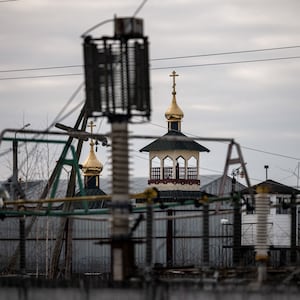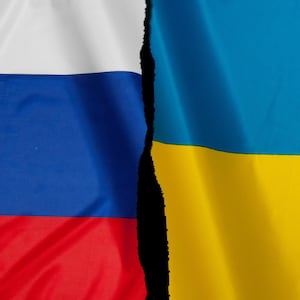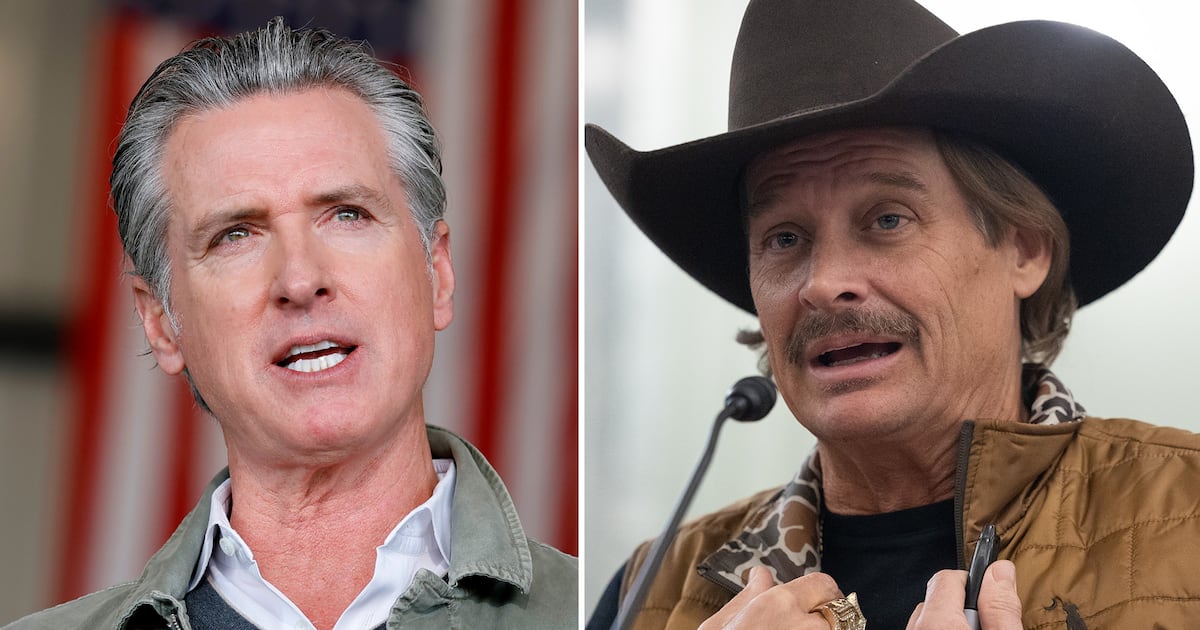MOSCOW—On Thursday, Russia woke up to news of alleged terrorists preparing to carry out violent attacks in nine of the country’s southern and northern cities. The Federal Security Service (FSB) reported that 16 suspects from a Ukrainian far-right neo-Nazi group known as “Maniacs. Cult of Killers” (M.K.U.) were arrested in connection with the plot.
A video of the Thursday arrest released by the FSB—the successor to the KGB—features armed special unit officers breaking into an apartment. One of the officers is heard yelling: “Down on the ground, on the ground!” With their hands behind their heads, several half-naked young men—some sporting Nazi tattoos—are shown spread out on the floor of a messy flat. In the clip, one of them admits to plotting a violent shooting spree against “non-white people and Arab nationals” on the orders of M.K.U.’s leader.
Little is known about the group and its origins. Its leader, Yegor Krasnov, is currently under arrest and on trial for five violent attacks in the Ukrainian city of Dnipro. A Ukrainian newspaper reported last year that the “maniac” leader and his three friends had published a video of himself on Telegram stabbing pedestrians.
Last month, Moscow-based investigative journalist Ilya Barabanov reported that Russian law enforcement agencies had linked M.K.U. members with imprisoned opposition leader Alexei Navalny, whose supporters and team members have been harshly persecuted by Kremlin loyalists, prompting mass protests and government crackdowns across the country.
“Law enforcements claimed they found fliers with M.K.U. symbols calling to join the pro-Navalny rally,” Barabanov told The Daily Beast. There are no indications that Navalny’s movement has ever cooperated with criminal organizations.
Shortly after Navalny’s arrest, one of the most popular pro-Kremlin television shows, Vesti, attempted to lump pro-Navalny rally organizers in with the M.K.U. The report claimed that both intend “violent actions” towards law enforcement with the support of “Western masterminds.”
The faces of the suspects featured in the video of the Thursday arrest are all blurred. One of them is a skinny young man with a Nazi tattoo printed across his chest that reads: “Jedem das Seine” (to each his own)—a slogan commonly displayed at entrances to concentration camps during World War II. In the clip, he admits to having joined M.K.U. in February.
Another man mumbles about the group’s goal to “combat directed violence, murders in the streets with a knife, a pistol or a machine gun.” A third suspect cheerfully proclaims that Krasnov, the group’s leader, had ordered the group to combat “murders, explosions, arson attacks and executions by shooting all non-white people and Arab nationals.”
Russia has been shaken by increasingly frequent reports of dozens of young people plotting mass murders in recent months, triggering painful memories for a country that has suffered frequent terrorist attacks on public places over the years.
In November, five men were sentenced to decades in prison for plotting to blow up an apartment building in Voronezh and murdering Russian military and law enforcers. Moscow’s FSB, Interior Ministry, and Investigative Committee had reported a joint special operation resulting in the arrests of three locals—an 18-year old, a 19-year-old, and a 33-year-old—suspected of printing nationalist slogans on the walls of the southern Russian city.
Another incident in March resulted in the FSB arresting 14 alleged M.K.U. members in the cities of Gelendzhik and Yaroslavl. The FSB report claimed that the leader of the M.K.U. network “had called on his followers to activate terrorist actions on the territory of Russian Federation.” Ukrainian analysts and StopFake activists denied any connection between Kyiv and the alleged terrorist attacks plotted in Russia.
Facebook subsequently blocked Russian media reports based on the FSB’s press releases, which prompted outrage in Moscow. Several state officials demanded to ban Facebook in Russia for “censorship.”
The latest news of plotted terror attacks on nine Russian cities comes shortly after Moscow withdrew huge military forces from the Ukrainian border. In recent days, Ukrainian President Volodymyr Zelensky has reportedly been attempting to arrange for talks with Russian President Vladimir Putin.
“This is a sign of de-escalation. I suppose there is a terrorist network established by Kyiv, where they consider Russia to be an enemy, so FSB arrests them before the presidents talk,” Yuriy Krupnov, a pro-Kremlin analyst, told The Daily Beast.
But independent observers are skeptical. Alexander Verkhovsky, the head of Sova Center—a Moscow-based group monitoring violent attacks by ultra-nationalists—says that he has doubts about ties between Russian far-right groups and the state of Ukraine.
“It looks like there was some far-right chatter on the internet that ordered the mission: first they dared the guys to write something radical on the wall, then to kill or blow something up,” Verkhovsky told The Daily Beast.
News of terrorist attacks on public places in Russia have been common in the Putin era. A series of bombings in apartment buildings, metro stations and airports have led to countless Russians being killed or wounded. In 2017, a subway bomb killed nine people and injured 50, including children, in St. Petersburg. Police arrested six “Islamic State” recruiters in connection with the attack. Now, the Kremlin is suggesting that the biggest threat comes not from Islamist terrorists, but far-right Ukrainian nationals.
As for ordinary Russians, this news is a nightmare. The public is growing increasingly anxious about their cities becoming targets for radicals plotting mass-murders.
“We have plenty of our own Russian far-right radicals, who might be preparing nasty actions,” Verkhovsky told The Daily Beast. “They don’t need some arrested Ukrainian nationalist to tell them what to do.”








